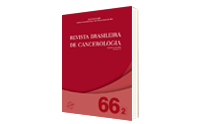Evaluation of Nutritional Status and Functional Capacity in Oncologic Patients undergoing Chemotherapy in Caxias do Sul – RS
DOI:
https://doi.org/10.32635/2176-9745.RBC.2020v66n2.377Keywords:
Nutritional Status, Muscle Strength, Neoplasms/drug therapyAbstract
Introduction: Cancer is the name given to a set of diseases that have in common the disorderly growth of cells. Impaired nutritional status is frequent in oncologic patients and negatively interferes in the patient’s daily life abilities. Objective: To evaluate the nutritional status and functional capacity of oncologic patients undergoing chemotherapy treatment. Method: Cross-sectional design, observational epidemiological study, with a sample obtained by convenience from 213 individuals undergoing outpatient chemotherapy treatment. The interviewees answered to the Patient-Generated Subjective Global Assessment (PG-SGA); functional ability was verified using handgrip strength (HGS) (hand dynamometry) and through the Eastern Cooperative Oncology Group (ECOG) scale for performance scale. Results: 213 patients were evaluated, 56.3%, elderly and 54.0%, females. Excluding head and neck neoplasms, there was a higher prevalence of well-nourished individuals according to PG-SGA (p=0.004); in relation to the body mass index (BMI), except for individuals with breast cancer, the highest prevalence was eutrophy (p=0.010). Individuals with adequate HGS (54.9%) were well nourished according to the SGA (91.5%) (p≤0.0001) and overweight according to the BMI (46.2%) (p=0.010). Still, fully active individuals (69.0%), were well nourished according to SGA (89.8%) (p≤0.0001) and eutrophic according to BMI (44.2%) (p=0.003), showing a significant difference in the assessment of nutritional status with functional capacity. Conclusion: The study demonstrated that the majority of cancer patients undergoing chemotherapy had satisfactory nutritional status, adequate muscle strength and were fully active.









